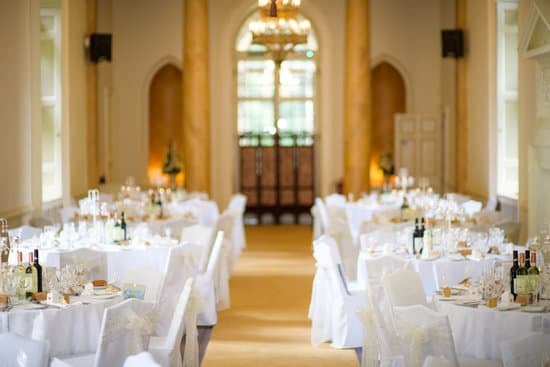Planning a wedding is undoubtedly an exciting time in any couple’s life, but it also comes with a whole array of decisions to make – starting with the budget. One of the first questions that come to mind when beginning to plan a wedding is: “How much is a wedding ceremony?” The answer to this question can vary significantly depending on various factors that influence wedding ceremony costs.
From the venue choice, catering options, guest count, and decor preferences to the location and time of year, there are numerous aspects that affect the overall cost of a wedding ceremony. Understanding these factors and how they impact your budget is essential for planning a memorable yet financially responsible event. In this article, we will delve into these influences and provide insights on breaking down the average cost of a wedding ceremony.
As couples navigate through the myriad of decisions when planning their special day, they often find themselves torn between DIY projects or hiring professionals for various services. It’s important to weigh in on which option saves more money in the long run while ensuring that every detail reflects your vision.
Additionally, considering hidden costs that may not initially be apparent can help avoid any budget surprises down the road. Through real examples and practical tips for saving money, we will explore different strategies for staying within budget without compromising on quality.
Breaking Down the Average Cost of a Wedding Ceremony
When planning a wedding ceremony, one of the first questions that often comes to mind is, “How much is a wedding ceremony going to cost?” While there is no one-size-fits-all answer to this question, understanding the average cost breakdown of a wedding ceremony can help you better estimate your own budget. Here is a breakdown of the average costs associated with a typical wedding ceremony:
- Venue rental: The venue is one of the most significant expenses for a wedding ceremony. On average, couples can expect to pay anywhere from $3,000 to $10,000 for the rental of a venue. Factors such as location, time of year, and amenities offered can all influence the cost.
- Officiant fees: The fee for an officiant to perform the wedding ceremony typically ranges from $200 to $This cost may vary depending on the experience and credentials of the officiant.
- Ceremony decorations: Decor plays a crucial role in setting the ambiance for your wedding ceremony. Couples can spend anywhere from $500 to $2,000 on flowers, aisle runners, arches, candles, and other decorative elements.
In addition to these main expenses, couples may also need to budget for items like music (live band or DJ), marriage license fees, transportation for the wedding party, and any special permits that may be required depending on the location of the ceremony. By breaking down these costs upfront and creating a detailed budget plan, couples can have a clearer idea of how much they need to allocate for their dream wedding ceremony.
- DIY decor: Get crafty and create your own centerpieces or ceremonial arch using materials from crafts stores or online retailers to save on decor costs.
- Opt for off-peak season weddings: Choosing a date outside of peak wedding season (usually spring and summer) can potentially save you money on venue rentals and other services.
- Limit guest list: One of the most effective ways to cut costs is by limiting the number of guests you invite. Fewer guests mean less food, fewer chairs needed for seating arrangements, and lower overall expenses.
By being strategic in your planning and considering all possible cost-saving options available, you can ensure that your dream wedding ceremony aligns with your budget without compromising on quality or style.
Venue Options and Pricing for Wedding Ceremonies
When it comes to planning a wedding ceremony, one of the most crucial decisions is choosing the perfect venue. The venue sets the tone for the entire event and can also significantly impact the overall cost of the ceremony. There are various venue options available, each with its own pricing structure and amenities. Some popular choices include traditional wedding venues such as hotels, banquet halls, and event centers, as well as more unique options like vineyards, museums, and outdoor gardens.
The cost of a wedding venue can vary widely depending on factors such as location, time of year, day of the week, and guest count. On average, couples in the United States spend around $4,000 to $10,000 on their wedding venue alone.
However, this number can go much higher or lower depending on individual preferences and budget constraints. It’s essential for couples to prioritize what aspects of a venue are most important to them – whether it’s a particular aesthetic, capacity size, or included services – in order to find a venue that fits both their vision and their budget.
In addition to traditional wedding venues, there are also more affordable options available for couples looking to save money on their wedding ceremony. Parks, beaches, community centers, or even private residences can serve as beautiful and cost-effective alternatives to pricier venues.
By thinking creatively and exploring different options beyond the typical wedding venues, couples can find a space that not only fits their budget but also adds a unique touch to their special day. Ultimately, the key is finding a balance between cost and quality when selecting a venue for your wedding ceremony.
Hidden Costs to Consider When Budgeting for a Wedding Ceremony
When budgeting for a wedding ceremony, it is crucial to consider all potential hidden costs that can easily add up and impact your overall expenses. One of the most commonly overlooked hidden costs is gratuities for vendors, such as photographers, caterers, and musicians.
While these are often included in the contract price, it is customary to tip these professionals for their hard work on your special day. Additionally, you may need to budget for transportation costs if your ceremony and reception venues are not in close proximity, especially if you want to provide shuttle services for your guests.
Another important hidden cost to consider when budgeting for a wedding ceremony is alterations and accessories for your attire. Wedding dresses often require alterations to ensure a perfect fit, which can sometimes be an unexpected expense. Similarly, don’t forget about shoes, jewelry, and other accessories that can enhance your overall look but may not be factored into your initial budget. These small details can quickly add up and catch you off guard if not accounted for in advance.
Lastly, couples should also be mindful of potential fees associated with permits or licenses required for certain aspects of their wedding ceremony. If you plan on having an outdoor ceremony at a public park or beach, there may be permit fees involved.
Additionally, some venues may require liability insurance or security deposits that are not included in the rental fee. By researching and understanding these potential hidden costs ahead of time, you can avoid any last-minute surprises and stick to your wedding budget more effectively.
DIY vs Hiring Professionals
When it comes to planning a wedding ceremony, one of the biggest decisions couples face is whether to go the do-it-yourself (DIY) route or hire professionals for various aspects of the event. This decision can have a significant impact on the overall cost of the ceremony. Here are some factors to consider when deciding between DIY and hiring professionals:
- Level of expertise: While DIY projects can save money, they often require a certain level of skill and expertise. For example, creating your own floral arrangements may be cost-effective, but if you lack experience in this area, you could end up spending more money fixing mistakes. Hiring a professional florist may result in a higher upfront cost, but it guarantees quality and saves you time and stress.
- Time commitment: DIY projects take time, and time is money. Consider how much time you have available leading up to the wedding. If you work full-time or have other commitments, taking on too many DIY projects could become overwhelming. In such cases, hiring professionals can save you time and ensure that everything runs smoothly on your big day.
- Quality vs. cost: Another aspect to consider is the quality of the final product or service. While DIY options may be cheaper upfront, they may not always be as high in quality as professionally done alternatives. Whether it’s photography, catering, or decor, think about what aspects of the ceremony matter most to you and where you’re willing to compromise on quality for cost savings.
Ultimately, the decision between DIY and hiring professionals depends on your budget, preferences, skills, and time constraints. While DIY can be a fun and personal way to add unique touches to your wedding ceremony without breaking the bank, it’s essential to weigh the pros and cons carefully before committing to this approach.
Remember that there are ways to strike a balance between DIY elements and professional services to create a memorable wedding ceremony that reflects your style and stays within your budget.
Tips for Saving Money on Wedding Ceremony Expenses
Wedding ceremonies are significant events in people’s lives, but they can also come with a hefty price tag. Fortunately, there are several ways to save money without sacrificing the beauty and magic of your special day. One tip for saving money on wedding ceremony expenses is to consider having a less traditional venue, such as a park, backyard, or even a friend or family member’s property. These options can often be more budget-friendly than traditional event venues.
Another way to cut costs is by looking for package deals from vendors that offer multiple services. For example, some photographers may also offer videography services or photo booth rentals as part of a package deal. This can help you save money compared to hiring each vendor separately. Additionally, exploring off-peak wedding dates and times can result in cost savings, as many venues and vendors offer discounts for weekday weddings or weddings held during non-peak seasons.
Furthermore, DIY projects can be a great way to add personal touches to your wedding ceremony while saving money at the same time. From handmade decorations to homemade favors, there are endless opportunities to get creative and reduce costs. By involving friends and family in DIY projects, not only do you save money but you also create memorable experiences together leading up to your big day.
| Tip for Saving Money | Description |
|---|---|
| Consider non-traditional venues | Opting for a park or backyard venue can save you substantial costs. |
| Look for package deals | Bundle services like photography and videography for potential discounts. |
| Embrace DIY projects | Create personalized decorations and favors with the help of friends and family. |
Real Wedding Budget Examples and Breakdowns
Planning a wedding can be both exciting and overwhelming, especially when it comes to budgeting for the ceremony. Real wedding budget examples and breakdowns can provide valuable insights into how much couples typically spend on their special day. By looking at these real-life scenarios, soon-to-be-wed individuals can better understand what to expect in terms of costs and where they can potentially save money.
Case Study 1: A Simple and Intimate Affair
In this example, Sara and John opted for a simple and intimate outdoor ceremony followed by a small reception at a local restaurant. Their total wedding ceremony costs came to around $8,000.
The venue cost accounted for the majority of their budget, with decorations, catering, and attire being other significant expenses. By prioritizing what was most important to them – a beautiful natural setting for the ceremony and delicious food for their guests – Sara and John were able to have a memorable day without breaking the bank.
Case Study 2: A Lavish Celebration at a High-End Venue
On the other hand, Emily and Michael decided to go all out for their wedding ceremony at a high-end venue in the city. With extravagant floral arrangements, a live band, and custom-designed invitations, their total costs soared to $30,000.
While this may seem like a lot of money, Emily and Michael wanted to create an unforgettable experience for themselves and their guests. By splurging on certain aspects of the wedding while cutting back on others, they were able to achieve the luxurious celebration they had always envisioned.
Case Study 3: A Budget-Friendly DIY Wedding
For Kim and Alex, keeping costs low was a top priority when planning their wedding ceremony. They opted for a DIY approach by making their own decorations, designing their invitations, and even having friends help with music and photography.
Their total expenses came in at just $5,000, proving that it is possible to have a beautiful and meaningful wedding without spending a fortune. Kim and Alex’s experience highlights the importance of creativity, resourcefulness, and thinking outside the box when it comes to planning an affordable but still memorable event.
How to Negotiate Prices With Vendors for Your Wedding Ceremony
When planning your dream wedding ceremony, negotiating prices with vendors can help you stay within your budget without sacrificing quality. By understanding the art of negotiation, you can potentially save hundreds or even thousands of dollars on essential services and products for your special day. Here are some tips on how to successfully negotiate prices with vendors for your wedding ceremony:
Research and Compare Quotes
Before entering into negotiations with vendors, it’s important to do your research and gather quotes from multiple sources. This will give you a better idea of the standard pricing in the industry and empower you to negotiate effectively. Make sure to compare the services offered by different vendors along with their pricing structure so you can make an informed decision.
Communicate Your Budget Clearly
One key aspect of successful price negotiation is transparency about your budget. Let vendors know upfront what you are willing to spend on each service or product they provide. This will help them tailor their offerings to fit within your budget constraints and may open up opportunities for discounts or package deals that align with your financial limits.
Ask for Customized Packages
Instead of opting for standard packages offered by vendors, consider asking for customized packages that meet your specific needs while staying within your budget. Many vendors are willing to create personalized packages based on the services you require, so don’t hesitate to discuss your preferences and negotiate a package that works best for both parties involved.
By following these negotiation strategies, you can maximize savings on your wedding ceremony expenses while still ensuring a beautiful and memorable event. Don’t be afraid to advocate for yourself and seek out the best possible deals with vendors who are committed to making your dream wedding a reality at a price that works for both parties involved.
The Impact of Location on Wedding Ceremony Costs
When considering the impact of location on wedding ceremony costs, it’s important to think about the availability of venues and vendors in the area. In some locations, there may be a limited selection of venues or vendors, which can drive up prices due to higher demand.
Additionally, travel costs for vendors who need to transport their goods or services to a remote location may also add to your overall expenses. Couples should carefully research different locations and weigh the pros and cons of each in relation to their budget.
Another factor to consider when looking at how location impacts wedding ceremony costs is local taxes and regulations. Some areas have higher sales taxes or require certain permits or licenses for hosting events, which can add unexpected costs to your wedding budget.
It’s important for couples to thoroughly research the legal requirements and financial implications of hosting a wedding in a specific location before making any commitments. By being aware of these potential extra costs, couples can better manage their budget and avoid any surprises down the road.
Conclusion
In conclusion, planning and budgeting for your dream wedding ceremony can be a daunting task, but by being mindful of the various factors that influence costs and taking into consideration the tips provided in this article, you can ensure that your special day is both memorable and affordable. Understanding how much a wedding ceremony may cost involves careful research, comparison shopping, and making decisions that align with your priorities and financial capacity.
One key takeaway from this guide is the importance of setting a realistic budget early on in the planning process. By breaking down the average cost of a wedding ceremony and considering venue options, hidden costs, DIY vs. hiring professionals, as well as potential savings opportunities, couples can avoid unnecessary stress and financial strain as they prepare to tie the knot.
Remember that negotiating prices with vendors can also make a significant impact on how much you ultimately spend on your wedding ceremony. Being open to flexible arrangements and exploring different options can help you achieve your desired vision without breaking the bank. With careful planning, research, and resourcefulness, you can create a magical wedding ceremony that is not only beautiful but also within your means.
Frequently Asked Questions
What Is a Reasonable Budget for a Wedding?
Setting a reasonable budget for a wedding depends on many factors such as location, number of guests, and desired level of extravagance. On average, weddings in the United States can range from $20,000 to $30,000.
Is $5,000 Enough for a Wedding?
While $5,000 may not be enough for a traditional wedding with all the bells and whistles, it is possible to have a beautiful and meaningful ceremony within that budget. Couples can prioritize what is most important to them and make adjustments accordingly.
Who Pays for the Wedding Ceremony?
Traditionally, the bride’s family pays for the wedding ceremony and reception expenses while the groom’s family covers the rehearsal dinner and honeymoon costs. However, modern couples often split expenses or pay for their own wedding to maintain financial independence.

I have been involved in marriages for over 20 years helping couples and singles understand more about them.





